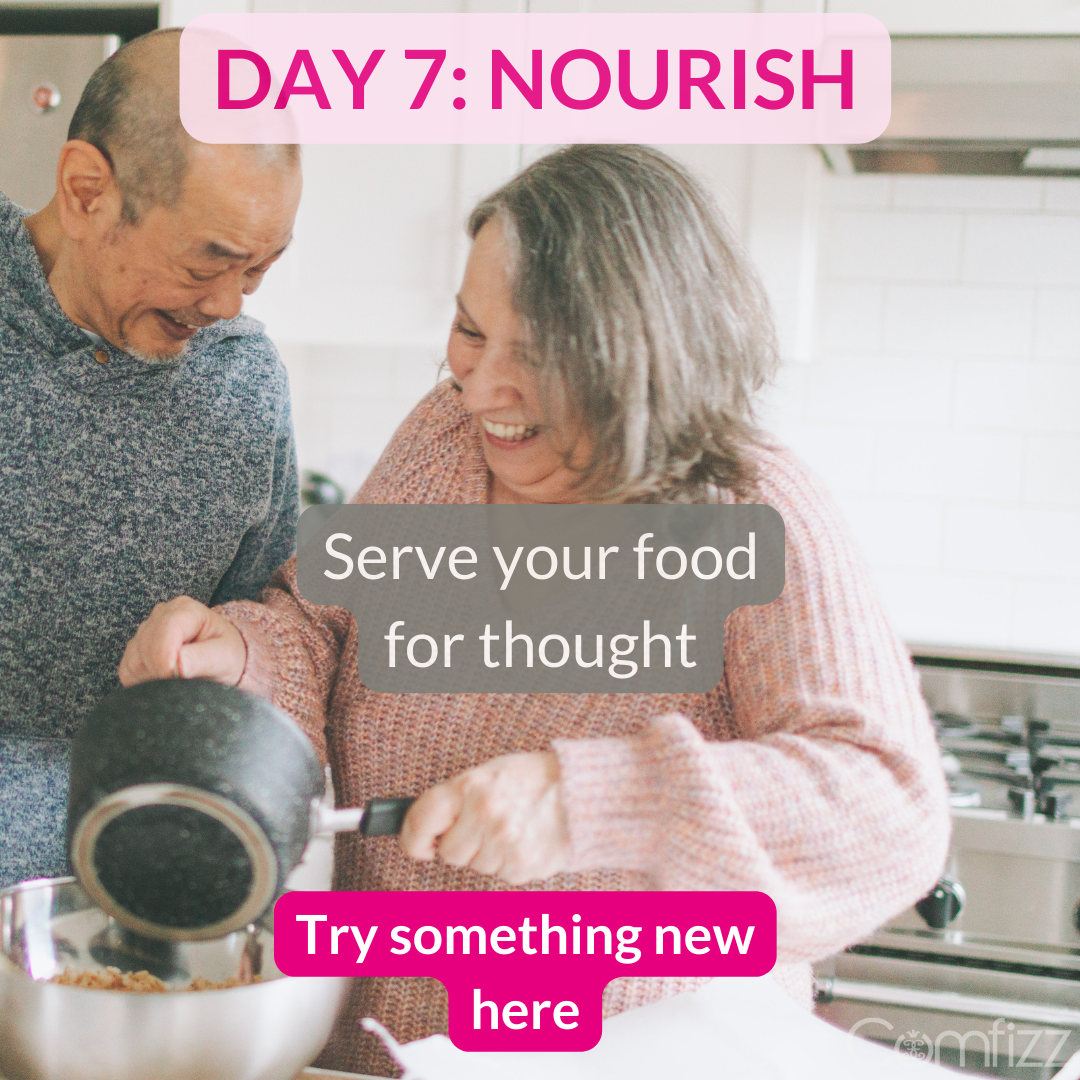Welcome to our Day 7 of our "10 days of self-care" & thank you for putting you first & joining us.
Today (3rd January 2023), we are going to be exploring nutrition and finding out the importance of nutrition with an ostomy, as well as sharing some links to existing blog posts we have on food & drink.
Having an ostomy & eating
For the large majority, ostomy life does not mean that you have to give up eating and getting enjoyment from this. A lot of people who have had surgery due to something such as chronic bowel disease do actually find the opposite - that you're actually opened up to a world of food you couldn't dream of before because of pain, nausea and more. This is often more prevalent with those who have had to have a colostomy or ileostomy.
There are also people who have had surgery to form a urostomy to divert urine from the body after the bladder is either removed or bypassed.
After surgery for either a urostomy, colostomy or ileostomy, you may naturally be scared of food or drink, especially if either have caused you problems before. Often, a dietitian can help you to get a plan in place to reintroduce foods at a pace you find more comfortable and one that is less overwhelming.
Eating & being nourished are a vital part of recovery and also our health in general.

It is important to remember that everyone is different and some may have medical needs beyond what this blog post covers. It will take time to find what works best for you and what your body can tolerate. These are just some guidelines based on United Ostomy Associations of America, Inc (UOAA) PDF document on 'Eating With An Ostomy.' Always seek medical advice when dealing with diet soon after ostomy surgery.
A healthy diet
A healthy diet may look a little different to someone with an ostomy because, as mentioned above, it depends on what you can tolerate. Some people may find they can pretty much eat what they want with no issues, whereas others find they have to exercise a bit more precaution or even cut some foods out.
General advice for everybody, surgery or not, is to choose foods from all food groups in the right amounts for their weight, bodies and medical needs. Foods high in added sugars, salt, saturated fats and trans fats are often advised in smaller quantities.
Often, the best thing you can do is make a small change which will enable you to eat healthier but won't leave you feeling overwhelmed and it is often advised for ostomates to try new things especially in small portions, one new thing at a time and chew well. This way, if something causes a problem, you're more likely to identify what has caused it.

More details on what a healthy diet contains and more on the food groups can be found in the UOAA's 'Eating With An Ostomy' PDF.
Links to ostomy recipes and blog posts on ostomy diet
- 5 gut-warming recipes for ostomates
- Can you drink alcohol with a stoma?
- Festive Top Tips - A guide from ostomates to ostomates
- Does an ostomy bag smell?
- Pancake Day - the tempting kind!
Colostomy
Depending on what type of colostomy is formed will impact what is absorbed. If a portion of the colon is removed or bypassed (descending or sigmoid colostomy), most nutrients will still be well absorbed. For someone who has had a larger portion of the colon removed or bypassed, they can experience decreased fluids and electrolytes absorption and in those who have had most or all of the colon removed, this stands the same.

Also, for those who have had most or all of the colon removed, dehydration is more likely to occur sooner and more extreme with sweating, diarrhoea and/or vomiting. Generally, stool that is thicker means more nutrients and fluids are being properly absorbed.
Ileostomy
Where the entire large intestine (colon), rectum and anus are removed or bypassed, this can impact absorption.
People can often experience reduced ability to absorb nutrients, fluid and electrolytes and are also at risk for dehydration and more severe dehydration as those are with a colostomy. Often, severe dehydration requires intravenous (IV) fluids in hospital in order to get the body's hydration up to a safe level. Having ileostomy surgery may also impact ability to absorb Vitamin B12.
Vitamin B12 helps to keep blood and nerves cells healthy and also helps make DNA. It can also prevent a certain type of anaemia, that is a blood condition, known to make people tired and weak. It helps to do this by assisting in the formation of red blood cells. The brain is also helped a lot by Vitamin B12.
Foods to thicken Ileostomy output
- Bananas
- Applesauce
- Smooth peanut butter
- White rice and bread
- White pasta
- Marshmallows
- Peeled potatoes
- Medications such as loperamide (ileostomy surgery may also impact how well medication is absorbed)
Again, this is just a general guideline and may not work for everyone.
Diet and urostomy considerations

Having urostomy surgery can lead to noticing a change in urine colour or odour when eaten.
Foods that can impact urine colour are:
- Beets
- Foods that contain dyes
- Some medications such as iron tablets
- Other people also report others in individual cases
Foods that can impact urine odour are:
- Asparagus
- Beer (carbonated drinks can too)
- Broccoli
- Fish
- Garlic
- Some spices
-
Some medications
Foods to generally avoid with an ileostomy or colostomy
After surgery, your ostomy and stomach can be unsettled and this is very normal. It is important you follow medical advice then when you get further down in the line in your recovery, your medical team will advise you when you can try new things.

Food can impact the consistency of output with both an ileostomy and colostomy so what you eat is often a vital part in controlling your output thickness & frequency. With an ileostomy, a "porridge-like" consistency is often said to be ideal, but sometimes, some foods can also cause blockages, so it's important to be aware of this.
Foods to avoid which may cause a blockage include:
- Coconut
- Nuts
- Pulses
- Lentils
- Beans
- Mushrooms
- Sweetcorn
- Popcorn
- Raw fruit or vegetable skins
- Bean sprouts
- Bamboo shots
- Dried fruit such as raisins
- Pith, pips and stones
- Celery
Signs of an ileostomy blockage
Urgent medical advice must be sought if you think this may be happening. Signs include:
- No stoma output, little output or output that contains large amounts of watery fluid
- Pain in the abdomen
- Feeling or being sick
- Abdominal swelling
- Stoma swelling or increase in size
- Reduced wind or no wind at all
Credit to Salts Advice on Diet and Hydration.
Do you find there are certain foods you have to avoid? We'd love to know! Comment below.
Happy cooking! Enjoy the rest of your day and be proud of the fact that you have managed to put some time aside for you!
Disclaimer: As always, this post is from our Social Media & Marketing Specialist, Amy's, experience of living with a permanent ileostomy, Crohn's Disease and from what she has researched. Nothing in our blog posts should be taken as medical advice. It's always best to consult a medical professional if you have queries or concerns.

SHARE TO SUPPORT A LOVED ONE
You can also share this article via our buttons under "tags" below.
10 DAYS OF SELF CARE: CATCH UP
- Join Us For 10 Days of Self-Care
- Day 1: Breathe
- Day 2: Read
- Day 3: Listen
- Day 4: Meditate
- Day 5: Rest
- Day 6: Journal
WHAT BLOG POSTS WOULD YOU LIKE TO SEE?
We are always looking for new topics to write about! If you have any ostomy life questions you'd like answering or any subjects you'd like us to address, please comment below or email us at info@comfizz.com.
JOIN OUR SUPPORT NETWORK
SHOP WITH US






Leave a comment